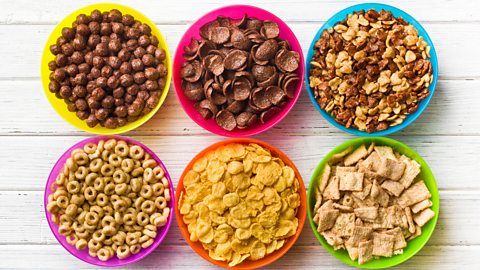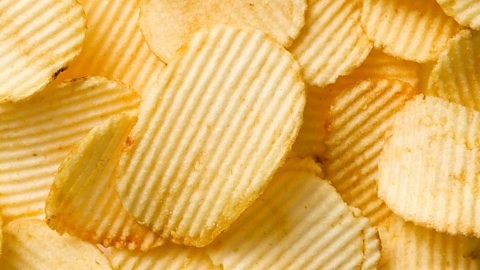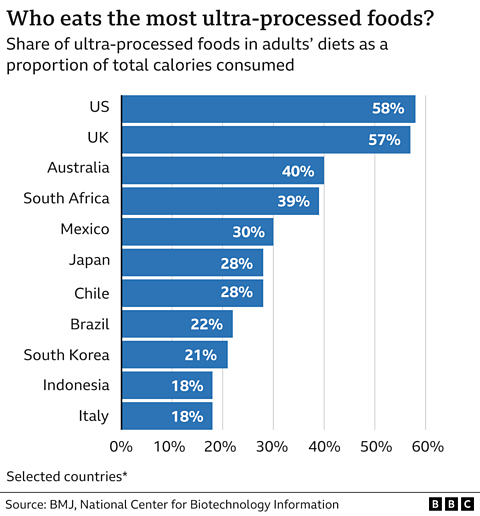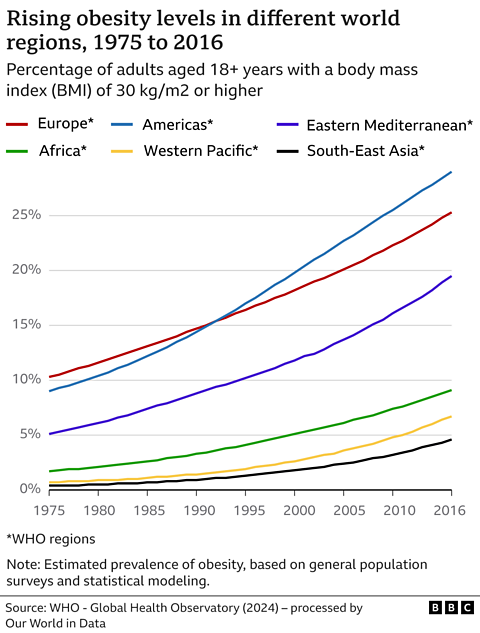What is ultra-processed food and what does it mean for my health?

Ultra-processed foods (UPFs) have been linked to more than 30 different health problems, including heart disease, cancer and anxiety.
In the UK, over half the calories in people's diets come from ultra-processed foods, and they are becoming increasingly common around the world. Most recently, a study has found that people who eat lots of UPFs may be at greater risk of dying early.
What is ultra-processed food?
There is no single definition of ultra-processed foods, but in general they contain ingredients not used in home cooking.
Many are chemicals, colourings and sweeteners, used to improve the food's appearance, taste or texture.

Fizzy drinks, sweets and chicken nuggets are all examples. However, they can also include less obvious foods, including some breads, breakfast cereals and yoghurts.
How are ultra-processed foods different to processed foods?
To help people identify different types of food, a system dividing them into four groups is often used.
These are unprocessed and minimally processed foods; processed ingredients; processed foods and ultra-processed foods.
Processed foods are a combination of whole foods – such as fruits, vegetables, nuts and eggs - and processed culinary ingredients.
For example, bread made from wheat flour, water, salt and yeast is a processed food.
However, if emulsifiers, colourings or preservatives were added, the bread would be ultra-processed.
How can I recognise ultra-processed food?
A product containing more than five ingredients is likely to be ultra-processed, according to public health expert Prof Maira Bes-Rastrollo of the University of Navarra in Spain.
Ultra-processed foods are often high in salt, sugar and saturated fats. In the UK, look out for a "traffic light" label on the packaging.
It could be "fresh food" but have a long shelf life, because of preservatives. Check the labels for ingredients like sodium benzoate, nitrate and sulphite, BHA and BHT.
Is eating ultra-processed food bad for you?
There is no definitive evidence about the health impact of eating ultra-processed food, however there is growing evidence they are linked to poor health outcomes and even early death.
A recent study examined data on diets and mortality in eight countries including the UK, where it’s estimated 53% of a person’s calorie intake comes from UPFs.
The report found 14% of early deaths in the UK could be ‘attributable to ultra-processed food intake.’
In addition, a 2024 study in the British Medical Journal- based on information from 9.9 million people worldwide – linked UPFs to:
- a higher risk of death from cardiovascular illnesses (such as heart attack and stroke)
- obesity
- type 2 diabetes
- sleep problems
- anxiety and depression
However, studies have been unable to prove if it’s the processing of food that causes illnesses, or simply the fact that most of them are high in fat, sugar and salt. These are a known cause of weight gain, type 2 diabetes, heart disease and some cancers.
How much ultra-processed food is eaten in the UK?
People in the UK are among the biggest eaters of ultra-processed food.
While statistics vary, in addition to the 2025 study which found 53% of the UK’s calorie intake is made-up of UPFs, an earlier study found UPFs accounted for 57% of calories consumed by the average adult, and 65% for children.
The most commonly eaten ultra-processed foods in the UK are:
- factory-made bread (11% of calories in a typical diet)
- pre-packaged meals (8%)
- breakfast cereals (4%)
- sausages and other reconstituted meat products (4%)
- confectionery (4%)
- biscuits (4%)
- pastries, buns and cakes (3%)
- factory-made chips and fries (3%)
- soft drinks, fruit drinks and fruit juices (3%)
- salty snacks including crisps (2%)
- sauces, dressings and gravy (2%)

How have ultra-processed foods affected UK health?
There is evidence that ultra-processed foods are linked to being overweight or obese, although it is not conclusive. Not all ultra-processed foods are unhealthy.
According to the NHS, it’s estimated one in four adults and one in five children aged 10 and 11 are obese.
"Weight gain is the first and most obvious effect of eating ultra-processed food," says Dr Chris van Tulleken, an immunologist from University College London, who has also written about nutrition.
"These foods are already high in fat, salt and sugar. But they are also designed - through their textures, colours and flavours - to be eaten in excess."
Children from poorer households are thought to eat more ultra-processed food than others.
"In lower-income families, parents tend to give children food that they know they're going to eat, so it doesn't go to waste," says Dr Duane Mellor of the British Dietetic Association.
How have ultra-processed foods affected countries worldwide?
Across the world, people have been swapping traditional diets for ultra-processed food. While statistics vary, a 2022 study found that in South Korea, Japan, Malaysia, Brazil and Chile, for example, it makes up 20 - 30% of people’s calorie intake.
A 2024 study found that in South Africa, the figure is 39%.

A study by Imperial College London suggests that more than one billion people worldwide - about one in eight – are obese.
It says that among children and adolescents, the rate of obesity increased five-fold between 1990 and 2022. It more than doubled for women and nearly tripled for men.
And the most recent data from the World Health Organization (WHO), says that worldwide, 16% of adults are obese with the prevalence of obesity having doubled between 1990 and 2022.
Previous data, from 2016 stated over 28% of adults in the Americas are now obese, as are 26% in Europe, 19% in the Eastern Mediterranean and 9% in Africa.

"In many countries in the world, ultra-processed food is now more affordable, and more accessible, than the traditional whole foods in the markets," says Dr Claire Johnson, a nutrition specialist at the UN agency for children, Unicef.
More people worldwide now have type 2 diabetes, according to the International Diabetes Federation.
"The sugar, salt and fat in ultra-processed food are all risk factors for developing type 2 diabetes - as well as a diet high in calories and low in nutrients," says Jaakko Toumilehto, a professor of public health at the University of Helsinki.
The Middle East and North Africa have seen a particularly high increase in the number of people with type 2 diabetes.
"Many of these countries don't produce food themselves," he says. "Ultra-processed food is easy to transport and store,” says Prof Toumilehto.
And ultra-processed food is said to be contributing to malnutrition in many sub-Saharan nations, says Dr Johnson.
"It often lacks the micronutrients which are contained in traditional whole foods, such as iron, minerals and vitamins," she says.
However, scientists at Purdue University in the US say ultra-processed foods could have some benefits, including:
- providing nutrients such as vitamin E and calcium
- offering a more affordable option than fresh food for people on low incomes
- reducing food wastage and the risk of food poisoning
The British Nutrition Foundation, which works with and takes donations from food companies, also highlights that not all ultra-processed foods are equal.
"Some foods that can be classified as ultra-processed, such as wholegrain breakfast cereals, wholemeal breads and low-fat yogurts can be lower in fat, salt and sugar," says Sara Stanner, its science director. "These can be sources of essential nutrients and fibre."
Originally published June 2019. Updated March 2024 and April 2025



